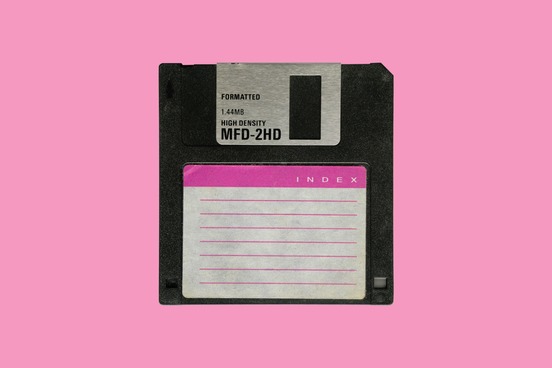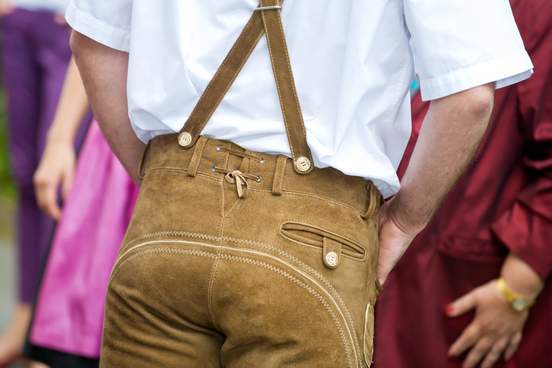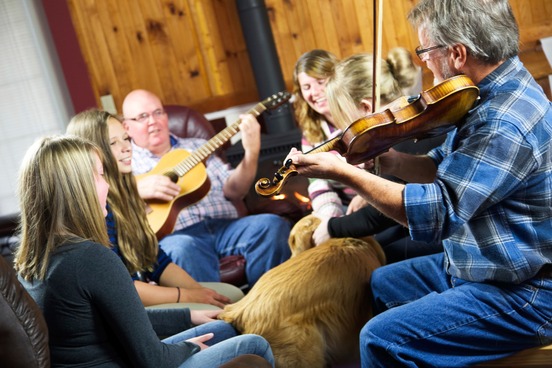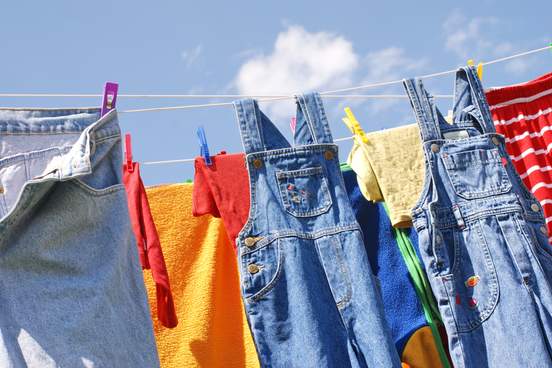
Introduction

Floppy Disk
Definition:
noun: a thin plastic disk coated with magnetic material on which data for a computer can be stored
About the Word:
The first known use of the word floppy disk was in 1972, and while the last known use isn’t marked it’s certainly a term, and tool, that has fallen out of use. We’re pretty sure our kids have no idea what a floppy disk is. For those whippersnappers who have yet to find our stash of them in the desk drawer with all the loose rubber bands, old keys, and binder clips, floppy disks were often—as their name suggests—floppy, but sturdier varieties existed as well.
Ironically, the icon that often means “save” on software and apps today is in fact an image of a floppy disk.
Recent Example:
When Mark Necaise got down to his last four floppy disks at a rodeo in Mississippi in February, he started to worry. Necaise travels to horse shows around the state, offering custom embroidery on jackets and vests: “All of the winners would get a jacket and we’d put the name of the farm or the name of the horse or whatever on it,” he says. Five years ago, he paid $18,000 for a second-hand machine, manufactured in 2004 by the Japanese embroidery equipment specialist Tajima. The only way to transfer the designs from his computer to the machine was via floppy disk.
— Jacopo Prisco, Wired, 6 Mar. 2023

Gallivant
Definition:
verb: to travel, roam, or move about for pleasure
About the Word:
Back in the 14th century, gallant, a noun borrowed from the French word galant, referred to a fashionable young man. By the middle of the next century, it was being used more specifically to refer to such a man who was attentive to, and had a fondness for, the company of women. In the late 17th century, this “ladies’ man” sense gave rise to the verb gallant to describe the process a suitor used to win a lady’s heart, and “gallanting” became synonymous with “courting.” It’s this verb gallant that is the likely source of gallivant, which originally meant “to act as a gallant” or “to go about usually ostentatiously or indiscreetly with members of the opposite sex.” Today, however, gallivant—while not tremendously popular—is more likely to describe pleasurable wandering than romancing.
Recent Example:
I went gallivanting through Midtown Manhattan and took some snapshots of popular points of interest, including the Vessel and the Empire State Building.
— Kimberly Gedeon, Mashable, 21 Nov. 2023

Britches
Definition:
plural noun: breeches, trousers
About the Word:
Britch? Please. There is no such thing as a “britch”; britches is strictly a plural noun. A variation on breeches, an old word for trousers or pants, britches isn’t a word you’re likely to see on clothes racks these days. But the word persists in the idiom too big for one’s britches—still as applicable today as ever for someone who has an exaggerated sense of their own importance, position, or abilities.
Recent Example:
These days, lederhosen-style garments made in China are available online for less than 100 euros ($107). Revelers preferring a more classic look book an appointment with leather tailor Klaus Bensmann for customized, handmade britches fashioned from deer or cow leather.
— Matthias Schrader and Kirsten Grieshaber, Associated Press, 14 Sep. 2023

Hootenanny
Definition:
noun: a gathering at which folk singers entertain often with the audience joining in
About the Word:
Hootenanny began as a synonym of gadget like gizmo or widget, and became something closer to shindig. But whereas a shindig is a social gathering or party with lots of dancing, the similarly festive hootenanny features folk singers passing the guitar (or washboard, or fife, or some such) and lots of singalongs. It need not be a concert, either—hootenannies can spring up anywhere!
Recent Example:
Guitar players and banjo pickers, fiddlers and mandolinists, even bongo drummers would form a half-dozen spontaneous circles with a different song building in each. The one player every circle wanted was [Pat] Campbell, who had a cool stage presence and a light touch on his upright bass, holding the hootenanny together as it went from daylight deep into the night.
— Sam Whiting, The San Francisco Chronicle, 12 Aug. 2022

Grody
Definition:
adjective: disgusting or revolting
About the Word:
Grody seems to have reach its zenith in the 1980s, as part of a wave of teen slang thought to have emerged from southern California generally and the San Fernando Valley specifically. The earliest known use in print however dates back to 1965, hewing closer to its grotesque influence with the spelling groaty. It is hella common for grody to be used in a phrase that includes another entry identified as relatively rare these days by our social media followers: “grody to the max.”
Recent Example:
Trash bags are not meant to hold liquid, and if you need room, all you have to do is ask. I am especially bitter because one time, I clocked in and the first thing I did was go change the trash at the condiment bar. ... There was so much grody old coffee pooled at the bottom of the trash bag that the bag broke, spilling all over my SHOE AND SOCK FIVE MINUTES INTO MY SHIFT. Bad, bad, bad.
— Audrey Engvalson, BuzzFeed, 22 July 2022

Dungarees
Definition:
plural noun: clothes made usually of blue denim
About the Word:
Dungaree dates back in English to the early 17th century, influenced by both the Hindi word dũgrī and the Urdu dungrī. Its earliest usage referred to a heavy coarse durable cotton twill woven from colored yarns, and specifically to blue denim. As a plural noun, dungarees refers to clothes made of denim, though English speakers are much more likely to use the word jeans.
Recent Example:
I grew up in a middle-class family, the third of four kids. I dressed in hand-me-downs or outfits my mom sewed herself or bought from discount bins. Instead of new Sasson jeans like the popular girls wore, I got my sister's old dungarees. I embroidered the back pockets and made them my own.
— Abby Alten Schwartz, Business Insider, 20 Nov. 2023

Icebox
Definition:
noun: refrigerator
About the Word:
The word icebox may seem like a throwback to the age of TV dinners and Jell-O molds, but it’s actually much older than that.
The first known use of icebox dates to the late 1700s—a long time before the invention of the electric household fridge. Back then an icebox was an insulated cabinet or box with a compartment for ice. However the word is a relative neologism compared to refrigerator, which can be traced back to the early 1600s. Refrigerator was originally used to refer not only to cabinets but also rooms used for keeping food or other articles cool, long before it became English’s go-to word for the electric kitchen appliance.
Recent Example:
As refrigerators became more commonplace in American households, home cooks had a newfound ability to keep perishable ingredients chilled and food could last longer. This technological advancement opened up a world of possibilities for creating cold and refreshing desserts that could be stored in the icebox.
— Samantha Cochran, TheDailyMeal.com, 1 Oct. 2023

Ozone layer
Definition:
noun: an atmospheric layer at heights of about 20 to 30 miles (32 to 48 kilometers) that is normally characterized by high ozone content which blocks most solar ultraviolet radiation from entry into the lower atmosphere
About the Word:
According to the data, use of ozone layer in print saw a definite spike in the 1980s that lasted a decade or so before sharply declining. The cause of both the spike and decline is likely attributable to waning and waxing health of that portion of the atmosphere once severely damaged by chemicals, namely chlorofluorocarbons (or CFCs) that have since been widely banned. In other words, the ozone layer, also called the ozonosphere has been talked about a lot less frequently now that its depletion has slowed and stopped.
Recent Example:
Wooden satellites could have several advantages over the traditional metal ones. Unlike metal, wood completely burns up when re-entering the Earth’s atmosphere, and it doesn’t release harmful substances or debris in the process. A recent study from the National Oceanic Atmospheric Administration found that aluminum and exotic metals from rockets and satellites are present in about 10 percent of the aerosol particles in the stratosphere. This number could grow to about 50 percent, depending on how many satellites are launched into low Earth orbit, per the paper. Researchers have cautioned that these particles could damage the Earth’s ozone layer.
— Margaret Osborne, The Smithsonian Magazine, 20 Nov. 2023

Yuppie
Definition:
noun: a young college-educated adult who is employed in a well-paying profession and who lives and works in or near a large city
About the Word:
“Here Come the Yuppies!” proclaimed a 1984 Time magazine article that chronicled the tastes and mores of a new breed of “upwardly mobile folk with designer water, running shoes... and $450,000 condos.” The word most likely comes from a playful acronym: young urban professional + -ie. Powered by the bull market of the ‘80s and a post-Hippie embrace of materialism, yuppie symbolized a new style of consumer.
Recent Example:
The childhood friends, now in late middle age, remember not just the games they played but also the prevalence of organized crime that shaped the neighborhood, and, to some degree, their own lives. And they talk, of course, about how the neighborhood has changed, laughing about the influx of “yuppies” who don’t return hellos on the street.
— Eric Nelson, The New Yorker, 7 Dec. 2022

Parlor
Definition:
noun: a room in a private dwelling for the entertainment of guests
About the Word:
Nowadays you’re probably more likely hear the word parlor in reference to a business, such as a beauty parlor or funeral parlor. Use of parlor for a room in a private home used primarily for entertaining, though it occurs, may sound a bit quaint to some compared to living room or family room. But conversation (as opposed to watching movies or playing foosball or what have you) is key to a parlor, which makes sense given the word’s roots in the Anglo-French word parler, meaning “to speak or talk.”
Recent Example:
The front parlor features tall windows, the original marble mantel with a gas fireplace, and a cascading staircase, while the newly renovated kitchen is contemporary and sleek.
— Marni Elyse Katz, Boston.com, 20 Jan. 2021





